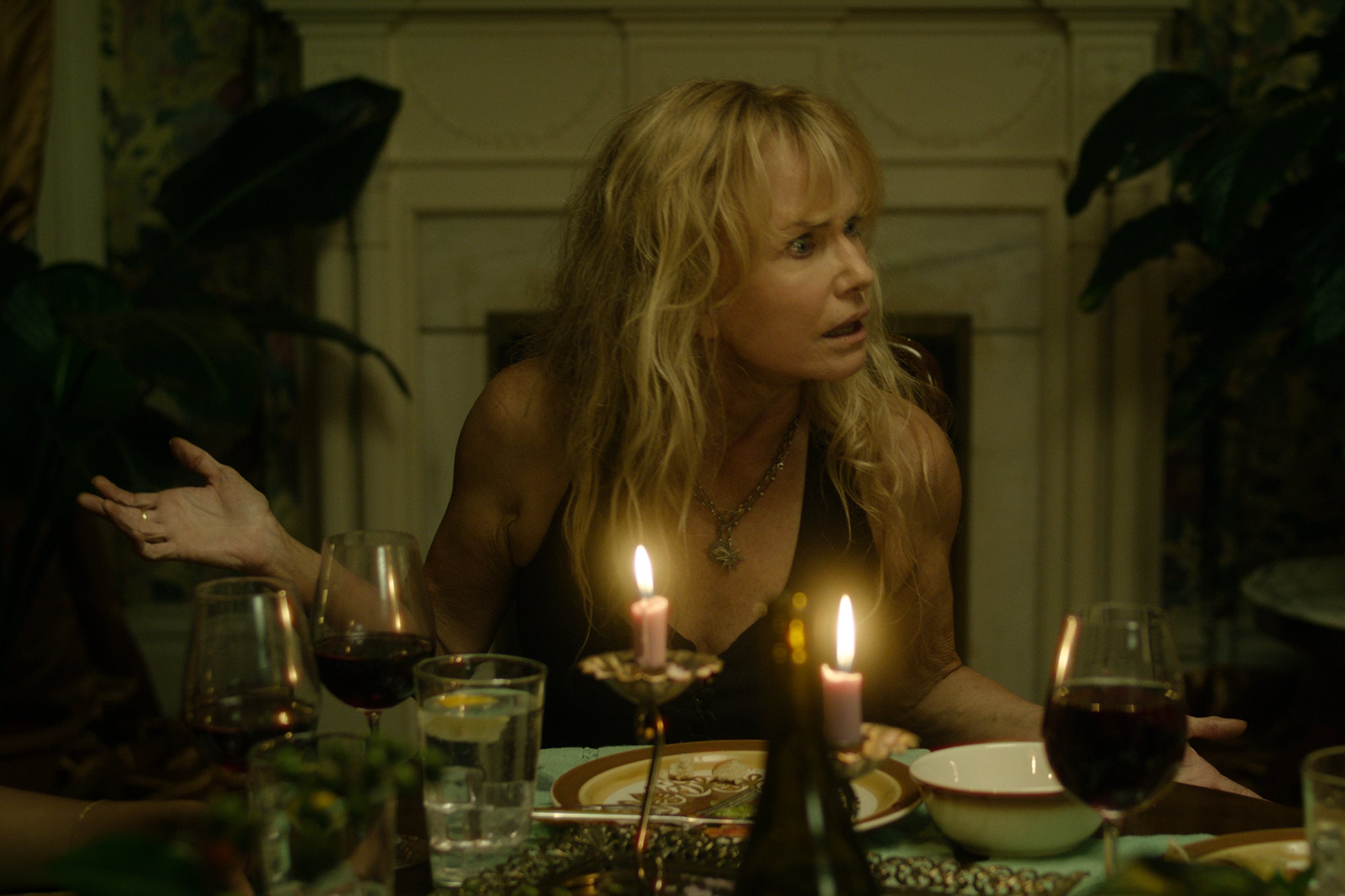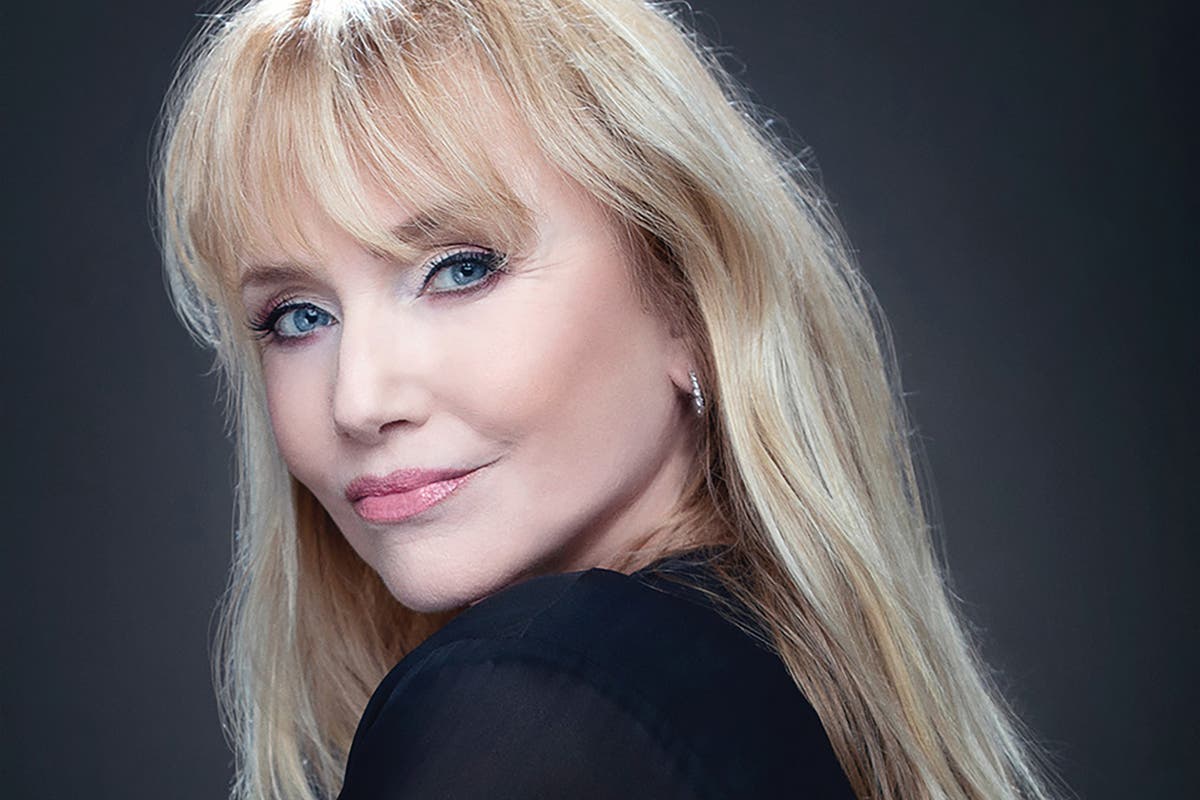Rebecca De Mornay never wanted to play the victim. “No matter how my characters did it, they always had to stand up as a peer to men,” she tells me. “They had to make their own way. Forcefully.” She emphasises that word, her teeth clenched, tiny but powerful in the window of our Zoom call. And, you know what, the 65-year-old really managed it. Tom Cruise’s canny call girl lover in Risky Business? Could probably rob you blind. The tough railway mechanic of Runaway Train? Could probably break your face. The vengeful nanny of The Hand That Rocks the Cradle? Well, duh.
De Mornay has a throaty cackle and a relaxed approach to interviews – she likes to talk, trails off with aplomb, rides conversational tangents for the hell of it. More than anything, though, she’s innately ferocious: secure, at ease, no bull. She recalls her ex, the late character actor Harry Dean Stanton – of Alien and Paris, Texas – once telling her that she was the most honest person he’d ever met. “And it was the greatest compliment I’ve ever received,” she says, wistfully. She has a particular effect on people. Leonard Cohen, her fiance for a time, dedicated his 1992 album The Future to her. “When I met [her], all kinds of thoughts came into my mind,” he once said. “How could they not when faced with a woman of such beauty?”
Her quite special kind of magnetism is on display in her new film, a psychological thriller called Saint Clare. She plays the wise grandmother to Clare (Bella Thorne), a young woman who keeps being put in the path of sexual predators – and who is also very good at killing them. There are shades of Joan of Arc to the movie, with Thorne’s character experiencing spiritual visions and being punished for her own strength. And De Mornay is exceptional in it, all big hair and mad speeches. “It was guerilla feminist filmmaking!” she beams. “It’s experimental. It’s hallucinatory. And Clare’s not a victim, you know? I love that message, and I love that they chose me to play this archetype of maternal protection.”
In Saint Clare, De Mornay’s character has been an actor herself, and she gets to reel off powerful monologues about the golden age of Hollywood and the erosion over time of strong female characters in movies. “Hollywood in 1931 was a radical bed of progressive ideas,” she says at one point. “Women weren’t just the femme fatale, the ingénue, the doting wife or the victim – they were whole people, and emancipated from the harness of how a woman was supposed to behave.”
It struck a chord with De Mornay, who recalls having to constantly fight for parts that felt complex and interesting. “When I started out, there were so many films with all these guys and just one girl, so you really wanted to get that one girl role,” she remembers. “It was just a lack of good writing. And nowadays that’s happening more and more. It’s all: ‘what can we rehash?’” (Depressingly, a Hand That Rocks the Cradle remake – with Longlegs star Maika Monroe – is announced a few weeks after we speak).
De Mornay always had a gritty self-possession – likely a product of her dramatic upbringing, which involved periods of living with her brother and actor mother in Los Angeles, Austria and England. The family had settled in the US by her late teens, and she’d trained at the famed Lee Strasberg Institute by her early twenties. It was on the set of Francis Ford Coppola’s doomed 1982 musical One from the Heart that she met and began a relationship with Stanton, who was more than three decades her senior but a kindred spirit all the same.
I’m an actress in a movie – I can’t base my self-worth on how it all turns out. And I’ve had peace ever since, and worked in Hollywood for 40 years now. I think that’s an incredible achievement
“There was a time when I thought I couldn’t be alive if he died,” she remembers. “He was that much of a pillar in my life. He had a genuine curiosity about life and other people – as I watched him and got to know him, he would treat a conversation with the plumber just as weightily as a conversation with Robert De Niro.” They were a couple for a few years, sharing a house together in the Hollywood Hills – the area she resides in to this day – and would talk about acting and the industry and spirituality. “He was an original thinker, believed what he believed and didn’t feel he had to toe the party line about anything.” They remained best friends until his death, at the age of 91, in 2017 – despite breaking up shortly after De Mornay was cast in Risky Business.
I tell her that I’d coincidentally watched the film for the first time a few months before we speak, and was surprised at how un-gross it was. Early Tom Cruise plus a sex worker he’s hired for the night plus 1983? Mathematically, this should equal sub-Porky’s nonsense, surely? But Risky Business is sort of oddly brilliant – a smart and ludicrously stylish dissection of class politics in Reagan-era America. Which, yes, also has Cruise dancing in his pants for a bit.

“It wasn’t about lusty teen boys,” De Mornay agrees. “It was elegant. When I first read the script, you could feel the soul of it, its intense wit and humour. I knew I wasn’t going to be exploited.” She thinks it’s one of the few films she’s done that ended up being exactly how she envisaged it on the page. “Even The Hand That Rocks the Cradle, I couldn’t predict the finished product. I thought, who’s going to watch a movie about a psychotic nanny?”

Watch Apple TV+ free for 7 days
New subscribers only. £8.99/mo. after free trial. Plan auto-renews until cancelled

Watch Apple TV+ free for 7 days
New subscribers only. £8.99/mo. after free trial. Plan auto-renews until cancelled
She describes the release of Risky Business as her “Cinderella moment”. She and Cruise were a real-life couple by then. “We were so in love, and the movie was a big smash, and I remember just feeling – wow, it’s just gonna go on like this!” She laughs. “Not the case! Not at all.” The film she made right after, the Hal Ashby romcom The Slugger’s Wife, was a disaster. A tornado blew through the set, then she and Cruise split, and then her performance in the film got bad reviews. “I had no real plan for what to do next. I knew I didn’t want to be typecast as ‘the sexy woman’, but it was all so difficult to navigate. Then, three years after Risky Business, my mother died. I was suddenly kind of orphaned, and everything after that just felt like I was flying by the seat of my pants.”
A little burnt by it all, she retreated to the UK and spent time in a Zen Buddhist monastery. “I came to realise how much of it was out of my control. The reviews I got for Risky Business were phenomenal, and then the reviews I got for Slugger’s Wife were really vicious. But none of it was actually true. I’m not as good as they were saying. And I’m not as horrible as they were saying, either. I’m an actress in a movie – I can’t base my self-worth on how it all turns out. And I’ve had peace ever since, and worked in Hollywood for 40 years now. I think that’s an incredible achievement.”

She’s had a fascinating career, too – small but memorable parts in movies like Wedding Crashers and the murder mystery Identity, roles on TV shows such as ER and Marvel’s Jessica Jones. And then there’s this year’s Peter Five Eight, a neo-noir thriller that paired her with, um, Kevin Spacey. The actor exists in a bit of a cosmic grey area at this point – acquitted by a jury of sexual assault charges, but largely blacklisted from major filmmaking. Did working with him give De Mornay pause?
“I think it’s really unfortunate, this entire sort of… politically correct handcuffing of everybody,” she says. “That you’re afraid on so many levels to ever speak your truth because you might get cancelled.” She says the last word with air quotes. “But, simply, I love Kevin Spacey’s acting, and this whole thing of, you know, his trials and the accusations… I wasn’t there. But I really don’t think he is [guilty]. I think he’s unjustly accused of a lot of stuff. I’m not sure why he was jumped on to the extent that he was. I think the timing was unfortunate with, you know, the Harvey Weinstein thing. But the bottom line is I chose to work with him because I love him as an actor, and I would work with him again.”

I begin to say that, beyond everything, Spacey’s talent is undeniable, but De Mornay interrupts. “I also want to say that if I really thought he was a violent predator of any kind, I would feel differently. But I don’t believe that about him. I’m not going to name them, but there are people whom I know or believe I know are violent predators, and those are people I wouldn’t work with.”
Her stance brings to mind, I tell her, what she’d said earlier about Stanton – that he never felt like he had to “toe the party line”. It clearly rubbed off on her. “It has served my spirit well,” she says. “But it hasn’t always been the most lucrative thing to do. I could have played into my type and made a killing, but I just couldn’t.”
She shrugs, proudly.
“I did it my way instead.”
‘Saint Clare’ premiered at FrightFest 2024 and will be released in the UK soon, with the date to be confirmed

